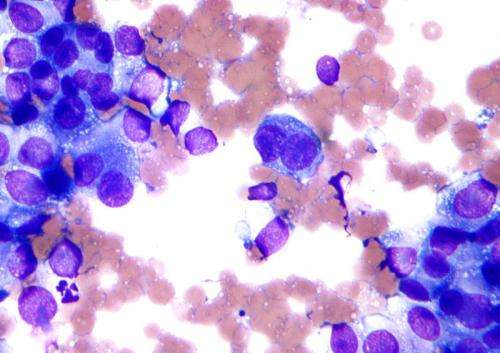September 8, 2015 report
Study suggests doctors should use more caution when using radiotherapy to treat skin cancer

(MedicalXpress)—A team of researchers in the U.S. has found that in some instances, using radiotherapy to treat skin cancers may be causing more harm than good. In their paper published in the journal Nature Immunology, the group describes a previously unknown mechanism that contributes to imunosuppression when radiotherapy is used. Guido Kroemer and Laurence Zitvogel of Université Paris offer a News and Views article on the work done by the group in the same journal issue.
As the researchers note, radiotherapy (ionizing radiation) is generally used in half of all skin cancer treatments, despite the fact that it very often does not work out as planned—quite often tumors shrink initially, but then come back even stronger. They suggest their new research offers an explanation of why that is—one aspect of radiotherapy may actually be making it easier for some skin cancer tumors to return and prosper. This may happen, they found, because the applied radiation causes a suppression of the immune system in the area being targeted. Then, a certain kind of immune cells that are located in the skin, known as Langerhans cells, along with some of the debris brought on by the treatment, migrate to draining lymph nodes, where they cause certain types of T cells to activate—those T cells, unfortunately, are the kind that tell the immune system to stop attacking, which allows the tumor to grow without having to deal with an immune response.
The researchers found these results in testing lab mice at their facility at Icahn Medical School in New York, that had been treated to have a reduction in Langerhans cells and then comparing the response with untreated wild mice. In so doing, they were actually able to see the Langerhans cells, along with other proteins from the tumor, make their way to the draining lymph nodes and the subsequent stimulation of T cells. They also found that those mice with inhibited Langerhans cells showed a better anti-tumor response.
The work done by the team suggests, Zitvogel and Kroemer advise, that going forward, doctors should be more cautious when using radiotherapy to treat skin cancers, particularly when treating large skin areas.
More information: Subversion of anticancer immunosurveillance by radiotherapy, Nature Immunology (2015) DOI: 10.1038/ni.3236
Abstract
Paradoxically, radiotherapy can reinforce immunosuppressive pathways that undermine anticancer immunosurveillance and treatment efficacy. Irradiation induces Langerhans cells to migrate from the skin to lymph nodes, where they stimulate regulatory T cells.
© 2015 MedicalXpress.com



















